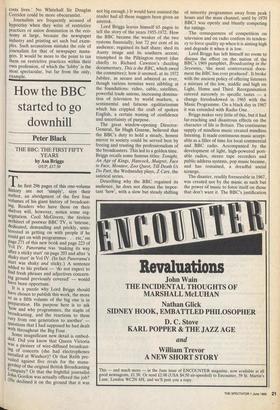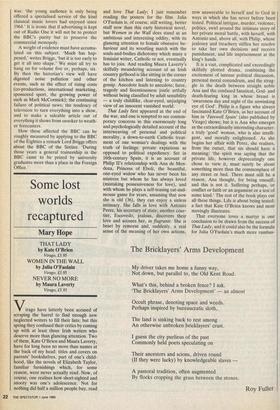How the BBC started to go downhill
Peter Black
THE BBC: THE FIRST FIFTY YEARS by Asa Briggs OUP, f17.50 The first 296 pages of this one-volume history are not 'simply', says their author, an abridgment of the first four volumes of his giant history of broadcast- ing. Readers who have those on their shelves will, however, notice some reg- urgitation. Cecil McGivern, the tireless architect of postwar BBC TV, is 'intense, dedicated, demanding and prickly, unin- terested in getting on with people if he Could get on with programmes . . . etc,' on Page 271 of this new book and page 223 of Vol IV. Panorama was 'making its way after a sticky start' on page 293 and after 'a shaky start' in Vol IV. (In fact Panorama's start was shaky and sticky.) A sentence added to his preface — 'do not expect to find fresh phrases and adjectives concern- ing ground previously covered' — would have been opportune. It is a puzzle why Lord Briggs should have chosen to publish this work, the more so as a fifth volume of the big one is in preparation. His purpose here is to ask how and why programmes, the staple of broadcasting, and the reactions to them vary from one generation to another' questions that I had supposed he had dealt with throughout the Big Four. Some insignificant new detail is embed- ded. Did you know that Queen Victoria Was a pioneer of wire-diffused broadcast- ing of concerts (she had electrophones Installed at Windsor)? Or that Reith pre- vailed against five rivals for the mana- gership of the original British Broadcasting , ompany? Or that the frightful journalist John Gordon was actually offered the job? (He declined it on the ground that it was not big enough.) It would have assisted the reader had all these nuggets been given an asterisk.
Lord Briggs leaves himself 65 pages to tell the story of the years 1955-1972. How the BBC became the weaker of the two systems financially; lost 72 per cent of its audience; regained its half share; shed its Aunty image and its southern accent; triumphed in the Pilkington report (due chiefly to Richard Cawston's dazzling documentary, This is the BBC, which awed the committee); how it seemed, at its 1972 Jubilee, as secure and admired as ever, though various termites were nibbling at the foundations: video, cable, satellites, powerful trade unions, increasing domina- tion of television by world markets, a sentimental and fatuous egalitarianism which has crippled the craft of spoken English, a certain waning of confidence and uncertainty of purpose.
The great window-opening Director- General, Sir Hugh Greene, believed that the BBC's duty to hold a steady, honest mirror to society could be served best by freeing and trusting the professionalism of the broadcasters. This led to a golden time. Briggs recalls some famous titles: Tonight, An Age of Kings, Hancock, Maigret, Face to Face, Monitor, Zoo Quest, Till Death Us Do Part, the Wednesday plays, Z Cars, the satirical series.
Describing why the BBC regained its audience, he does not discuss the impor- tant 'how', with a slow but steady shifting of minority programmes away from peak hours and the mass channel, until by 1970 BBC1 was openly and bluntly competing for ratings.
The consequences of competition on television and on radio confirm its tenden- cy to force quality up when it is aiming high and degrade it when it is low.
Lord Briggs has left himself no room to discuss the effect on the nation of the BBC's 1969 pamphlet, Broadcasting in the Seventies, 'the most controversial docu- ment the BBC has ever produced'. It broke with the ancient policy of offering listeners a mixture of the low, middle and high on Light, Home and Third. Reorganisation catered narrowly to specific tastes — a change foreshadowed in 1965 with the Music Programme. On a black day in 1967 it was extended with Radio One.
Briggs makes very little of this, but it had far-reaching and disastrous effects on the character of life in Britain. The continuous supply of mindless music created mindless listening. It made continuous music accept- able as a filler of time for local commercial and BBC radio. Accompanied by the development of light, high-powered port- able radios, stereo tape recorders and public address systems, pop music became, and has remained, a dreadful social scourge.
The disaster, readily foreseeable in 1967, was created not by the music as such but the power of music to force itself on those that don't want it. The BBC's justification
was: 'the young audience is only being offered a specialised service of the kind classical music lovers had enjoyed since 1964.' It is ironic that if advertising is kept out of Radio One it will not be to protect the BBC's purity but to preserve the commercial monopoly.
A weight of evidence must have accumu- lated on this subject. 'Much has hap- pened,' writes Briggs, 'but it is too early to get it all into shape.' We must all try to hang on for volume five or, perhaps, six. By then the historian's view will have digested noise pollution and other events, such as the effect of rising costs (co-productions, international marketing, sponsored sport, the growing power of such as Mark McCormick); the continuing failure of political news; the tendency of television to turn everything into a show, and to make a saleable article out of everything it shows from snooker to weath- er forecasters.
How these affected the BBC can be roughly measured by applying to the BBC of the Eighties a remark Lord Briggs offers about the BBC of the Sixties: 'During those years a general traineeship in the BBC came to be prized by university graduates more than a place in the Foreign Office.'



















































 Previous page
Previous page